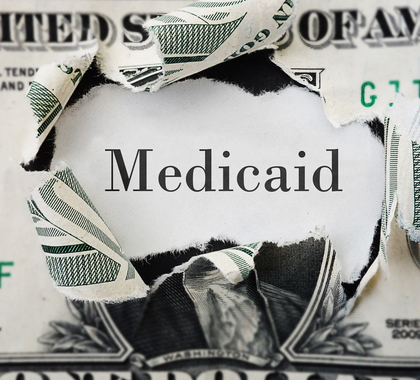Medicaid expansion has placed a severe financial strain on the budgets of the states that chose to expand under the provisions included in the Affordable Care Act (ACA). Medicaid expansion, at its core, builds on a failing model in which the federal government dictates multiple aspects of the government insurance plan, thereby losing the beneficial aspects of market competition. In several states, lawmakers are offering proposals to roll back or repeal their Medicaid expansion under new plans designed to improve the flawed program. Unfortunately, a new ballot proposal has emerged in Utah that would expand the state’s Medicaid program, despite all the evidence showing Medicaid expansion programs have failed in other states.
The ballot initiative would expand Medicaid coverage eligibility to all Utah citizens whose income is 138 percent of the federal poverty level or less. The expanded population, which consists of around 47,000 people, would cover families of three with incomes between $20,000 and $26,900.
To pay for the expanded Medicaid population, the ballot initiative calls for an increase in the state sales tax, from 4.7 percent to 4.85 percent. The laws supporters hope the tax increase would raise an additional $91 million to pay for the expansion. The funds would then draw matching funds from the federal government.
Contrary to expansion supporters’ depiction of the new federal funds as “free money,” Medicaid expansion is expensive. It creates new costs for states the federal government doesn’t cover or will not cover forever, leaving state taxpayers on the hook for new liabilities.
The matching funds the ballot proposal is counting on to help fund the program is unlikely to remain stable in the long term. There is no clear long-term source of funding for Medicaid, and the national government is $20 trillion in debt and will eventually have to trim its budget. The federal government has promised to cover 100 percent of the costs of newly eligible enrollees through 2017, but the matching rate declines over time, so states will eventually have to find other ways to pay for the newly eligible population.
Utah lawmakers should continue to resist Medicaid expansion and instead reform their fiscally unsustainable program in ways that would offer better care to enrollees and lower costs for taxpayers.
Fortunately for Utah policymakers, there is an option available to them that can help create greater access to high-quality, more-affordable health care without increasing state budgets or the national debt: Section 1115 waivers. Under provisions written into the original Medicaid law, state policymakers are able to apply for Section 1115 waivers from the U.S. Department of Health and Human Services (HHS), which, if approved, allow states more flexibility to innovate and make significant changes to their Medicaid programs.
Some reform proposals states can submit to CMS and the HHS Secretary through 1115 waivers include:
- Requirements that able-bodied beneficiaries work, look for work, or prepare for work.
- More flexible benefit packages, allowing the enrollment of Medicaid beneficiaries in subsidized employer coverage without providing cumbersome “wrap-around” benefits.
- Payment enforcement mechanisms to encourage enrollees to pay cost sharing.
- Deployment of incentives for enrollees to engage in healthy behaviors.
- Time limits on coverage, monthly income verification and eligibility renewals.
- Changes to what exchange recipients pay, benchmarks for setting payments, and rules concerning family size and income eligibility.
- A waiver replacing the traditional federal matching grant with a capped grant.
In addition to requesting waivers, states such as Utah should also work to repeal state regulations that are obsolete or counterproductive.
The following documents examine Medicaid reform and expansion in greater detail.
Medicaid Expansion in Utah Fails to Protect Utahns
https://libertasutah.org/free-market/medicaid-expansion-in-utah-fails-to-protect-utahns/
Josh Daniels of the Libertas Institute examines Medicaid expansion in Utah and how it fails to improve health care for most Utahans. “Simply put, the discussion over Utah Medicaid expansion under ‘Obamacare’ ignores the fundamental policy question about whether Utah should be providing taxpayer-funded health insurance or health care for able-bodied, childless, working-age adults at all,” wrote Daniels.
Health Care Reform: A Toolbox for Patriots and Policymakers
https://heartland.org/publications-resources/publications/health-care-reform-a-toolbox-for-patriots-and-policymakers
In this chapter from the fourth edition of The Heartland Institute’s Patriot’s Toolbox, Heartland CEO Joseph Bast and Senior Policy Analyst Matthew Glans address health care reform and discuss how policymakers can make health care more affordable and higher quality without increasing state budgets or the national debt. Bast and Glans also say their proposals won’t violate the freedoms belonging to patients or health care providers.
The Growing Medicaid Expansion Bubble
https://heartland.org/news-opinion/news/the-growing-medicaid-expansion-bubble?source=policybot
In this edition of the Consumer Power Report, Executive Editor Justin Haskins examines Medicaid expansion and all the problems it has created for states, physicians and patients. “Despite the lack of attention the issue is getting, the growing Medicaid population could lead to state government meltdowns around the country and a national health care crisis for which most Americans are completely unprepared,” wrote Haskins.
Here’s Why States Must Resist the Temptation to Expand Medicaid
http://www.forbes.com/sites/sallypipes/2015/07/27/heres-why-states-must-resist-the-temptation-to-expand-medicaid/ – 420cec6d5b80
Sally Pipes, president of the Pacific Research Institute, argues in this Forbes piece states should resist any push to expand Medicaid. Pipes recommends replacing Medicaid entitlements with block grants. “If governors and state legislatures really want to help low-income folks while keeping their budgets under control, they should insist Washington[, DC] replace the failed, open-ended Medicaid entitlement with block grants pegged to inflation,” wrote Pipes.
Government Report Finds Obamacare Medicaid Enrollees Much More Expensive than Expected
http://www.forbes.com/sites/theapothecary/2016/07/20/government-report-finds-that-obamacare-medicaid-enrollees-much-more-expensive-than-expected/ – 75a85aba2dd0
Brian Blase of the Mercatus Center at George Mason University wrote in Forbes the costs for newly eligible adults were not decreasing as expansion supporters predicted they would. Blase says in a new report, HHS says newly eligible adult Medicaid enrollees cost about 23 percent more than the Medicaid enrollees who were eligible prior to expansion.
The Oregon Experiment—Effects of Medicaid on Clinical Outcomes
https://heartland.org/publications-resources/publications/the-oregon-experiment–effects-of-medicaid-on-clinical-outcomes?source=policybot
This article from The New England Journal of Medicine examines Medicaid outcomes in Oregon. Oregon gave researchers the opportunity to study the effects of being enrolled in Medicaid (compared to being uninsured) based on data from a randomized controlled trial, the “gold standard” of scientific research. The results showed no improvement in health for enrollees, but it did reveal better financial protections for patients and increased medical spending.
Why States Should Not Expand Medicaid
https://heartland.org/publications-resources/publications/why-states-should-not-expand-medicaid?source=policybot
Writing for the Galen Institute, Grace-Marie Turner and Avik Roy outline 12 reasons states should not expand Medicaid and should instead demand from Washington, DC greater control over spending to better fit coverage expansion to states’ needs, resources, and budgets.
Effect of Medicaid Coverage on ED Use – Further Evidence from Oregon’s Experiment
http://www.nejm.org/doi/pdf/10.1056/NEJMp1609533
Amy Finkelstein, Sarah Taubman, Heidi Allen, Bill Wright, and Katherine Baicker examine the effect Medicaid coverage has on emergency room use. They found people enrolled in Medicaid significantly increase their emergency room visits for around two years after they first sign up. “For policymakers deliberating about Medicaid expansions, our results, which draw on the strength of a randomized, controlled design, suggest that newly insured people will most likely use more health care across settings – including the [emergency department] and the hospital – for at least 2 years and that expanded coverage is unlikely to drive substantial substitution of office visits for ED use.”
Medicaid Increases Emergency-Department Use: Evidence from Oregon’s Health Insurance Experiment
https://heartland.org/publications-resources/publications/medicaid-increases-emergency-department-use-evidence-from-oregons-health-insurance-experiment
Sarah Taubman, Heidi Allen, Bill Wright, Katherine Baicker, and Amy Finkelstein use the Oregon Health Insurance Experiment to study emergency department use among 25,000 lottery participants over a period of about 18 months after the lottery. The authors found, “Medicaid coverage significantly increases overall emergency use by 0.41 visits per person, or 40% relative to an average of 1.02 visits per person in the control group.”
Nothing in this Research & Commentary is intended to influence the passage of legislation, and it does not necessarily represent the views of The Heartland Institute. For further information on this subject, visit The Heartland Institute’s website, and PolicyBot, Heartland’s free online research database.
If you have any questions about this issue or The Heartland Institute’s website, contact John Nothdurft, The Heartland Institute’s government relations director, at [email protected] or 312/377-4000.




